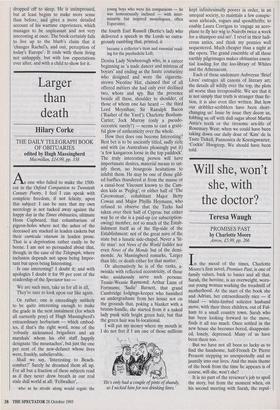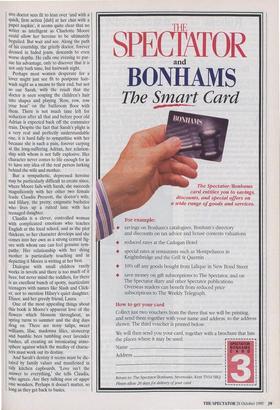Will she, won't she, with the doctor?
Teresa Waugh
PROMISES PAST by Charlotte Moore Arrow, £5.99, pp. 266 In the mood of the times, Charlotte Moore's first novel, Promises Past, is one of family values, back to basics and all that. Sarah, the heroine, is an overweight, worn- out young woman working the treadmill of motherhood. At the start of the book she and Adrian, her extraordinarily nice — if bland — white-limbed solicitor husband move, with their three children, out of Ful- ham to a small country town. Sarah who has been looking forward to the move, finds it all too much. Once settled in the new house she becomes bored, disappoint- ed, lonely, depressed. Many of us have been there too.
But we have not all been so lucky as to find the handsome, half-French Dr Pierre Prescott stepping so unexpectedly and so jauntily into our lives. And the main theme of the book from the time he appears is of course, will she, won't she?
It is no part of the reviewer's job to spoil the story, but from the moment when, on his second meeting with Sarah, the repul- sive doctor sees fit to lean over 'and with a quick, firm action [dab] at her chin with a paper napkin', it seems quite clear that no writer as intelligent as Charlotte Moore could allow her heroine to be ultimately beguiled. But wait and see. Along the path of his courtship, the grizzly doctor, forever dressed in faded jeans, descends to even worse depths. He calls one evening to pur- sue his advantage, only to discover that it is not only bath time, but hairwash night.
Perhaps most women desperate for a lover might just see fit to postpone hair- wash night as a means to their end, but not so our Sarah, with the result that the doctor is seen soaping the children's hair into shapes and playing 'Row, row, row your boat' on the bathroom floor with them. There is not much time left for seduction after all that and before poor old Adrian is expected back off the commuter train, Despite the fact that Sarah's plight is a very real and perfectly understandable one, it is hard fully to sympathise with her because she is such a pain, forever carping at the long-suffering Adrian, her relation- ship with whom is not fully explosive. Her character never comes to life enough for us to have any idea of the real person lurking behind the wife and mother.
But a sympathetic, depressed heroine may be particularly difficult to create since, where Moore fails with Sarah, she succeeds magnificently with her other two female leads: Claudia Prescott, the doctor's wife, and Hilary, the pretty, enigmatic bachelor who lives up a rutted lane with her teenaged daughter.
Claudia is a clever, controlled woman with complicated emotions who teaches English at the local school, and as the plot thickens, so her character develops and she comes into her own as a strong central fig- ure with whom one can feel genuine sym- pathy. Her relationship with her dying mother is particularly touching and in depicting it Moore is writing at her best. Dialogue with small children rarely works in novels and there is too much of it here, but never mind the toddlers, for there is an excellent bunch of spotty, inarticulate teenagers with names like Slash and Click- er, not to mention Hilary's quiet daughter, Elinor, and her greedy friend, Laura.
One of the most appealing things about this book is Moore's apparent love of the flowers which blossom throughout, as spring turns to summer and the dog days drag on. There are noisy tulips, sweet Williams, lilac, madonna lilies, stonecrop and bumble bees tumbling over lavender bushes, all creating an intoxicating atmo- sphere against which the medley of charac- ters must work out its destiny.
And Sarah's destiny it seems must be dic- tated by family values and manifested in tidy kitchen cupboards. 'Love isn't the answer, to everything,' she tells Claudia, who agrees. Are they talking eros or agape one wonders. Perhaps it doesn't matter, so long as they get back to basics.



































































 Previous page
Previous page